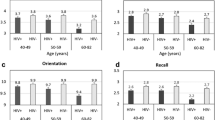Abstract
The purposes of this study were to assess cognitive disorders in HIV/AIDS patients, identify the prevalence of HIV-associated neurocognitive disorders (HAND), provide evidence that may be used for early diagnosis and treatment, and establish a baseline for follow-up studies. The setting for this study was Guangxi, a culturally and economically underdeveloped province located in southwestern China with a large minority community. Due to the specific geographic and cultural environment, Guangxi has the second highest HIV incidence in China. There have been no research or large epidemiologic studies exploring cognitive disorders in HIV/AIDS patients in Guangxi; therefore, the prevalence of HAND in patients is unknown. Thirteen tests from 12 reliable and valid neuropsychological instruments (the digit symbol test, trail making test, arithmetic scores, digit span, wood puzzle, immediate visual memory, visual memory, Stroop test, vocabulary fluency, conceptual fluency, and the Wisconsin Card Sorting Test) were used to test and compare the cognitive functions and prevalence of HAND in 99 healthy individuals and 230 HIV/AIDS patients. Within the patient group, 114 were HIV-positive without cognitive impairment and 86 (37.39 %) had HAND. Among them, 42 (18.27 %) had HIV-related neurocognitive impairment (ANI), 25 (18.87 %) had HIV-related mild neurocognitive disorder (MND), and 19 (8.26 %) had HIV-associated dementia (HAD). These results may be used for future research, such as neuroimaging studies and risk factor analysis of HAND, and in the development of early diagnosis and treatment options for HAND patients.
Similar content being viewed by others
References
Annett M (1970) A classification of hand preference by association analysis. Br J Psychol 61(3):303–321
Antinori A, Arendt G, Becker JT, Brew BJ, Byrd DA, Cherner M, Clifford DB, Cinque P, Epstein LG, Goodkin K, Gisslen M, Grant I, Heaton RK, Joseph J, Marder K, Marra CM, McArthur JC, Nunn M, Price RW, Pulliam L, Robertson KR, Sacktor N, Valcour V, Wojna VE (2007) Updated research nosology for HIV-associated neurocognitive disorders. Neurology 69(18):1789–1799
Chinese Ministry of Health (2012) China AIDS epidemic estimated in 2011. Chin J AIDS STD 18(1):1–5
Fang R, Tang H, Chen S (2010) Comparison of cognitive assessment in subjects with Alzheimer’s disease between Montreal cognitive assessment Chinese version and mini-mental state examination. Chin J Rehabil Med 25(4):319–321
Grant I (2008) Neurocognitive disturbances in HIV. Int Rev Psychiatry 20(1):33–47
Grant I, Caun K, Kingsley DPE, Winer J, Trimble MR, Pinching AJ (1992) Neuropsychological and NMR abnormalities in HIV infection: the St. Mary’s-Queen Square study. Cogn Behav Neurol 5(3):185–193
Hardy DJ, Hinhn CH (2002) Reaction time performance in adults with HIV/AIDS. J Clin Exp Neuropsychol 24(7):912–929
Heaton RK, Cysique LA, Jin H, Shi C, Yu X, Letendre S, Franklin DR Jr, Ake C, Vigil O, Atkinson JH (2008) Neurobehavioral effects of human immunodeficiency virus infection among former plasma donors in rural China. J Neurovirol 14(6):536–549
Joska JA, Westgarth-Taylor J, Hoare J, Thomas KG, Paul R, Myer L, Stein DJ (2011) Validity of the international HIV dementia scale in South Africa. AIDS Patient Care STDS 25(2):95–101
McArthur JC, Brew BJ (2010) HIV-associated neurocognitive disorders: is there a hidden epidemic? AIDS 24(9):1367–1370
Robertson K, Liner J, Hakim J, Sankalé J-L, Grant I, Letendre S, Clifford D, Diop AG, Jaye A, Kanmogne G (2010) NeuroAIDS in Africa. J Neurovirol 16(3):189–202
Sacktor NC, Wong M, Nakasujja N, Skolasky RL, Selnes OA, Musisi S, Robertson K, McArthur JC, Ronald A, Katabira E (2005) The International HIV Dementia Scale: a new rapid screening test for HIV dementia. AIDS 19(13):1367–1374
Shi C, Yu X, Heaton R, Jin H, Grant I (2005) Neuropsychological Feasibility Study among HIV+/AIDS persons in China. Chin Ment Health J 19(5):343–346
Simioni S, Cavassini M, Annoni JM, Abraham AR, Bourquin I, Schiffer V, Calmy A, Chave JP, Giacobini E, Hirschel B (2010) Cognitive dysfunction in HIV patients despite long-standing suppression of viremia. AIDS 24(9):1243–1250
Stern Y, McDermott MP, Albert S, Palumbo D, Selnes OA, McArthur J, Sacktor N, Schifitto G, Kieburtz K, Epstein L (2001) Factors associated with incident human immunodeficiency virus-dementia. Arch Neurol 58(3):473–479
Waldrop-Valverde D, Nehra R, Sharma S, Malik A, Jones D, Kumar AM, Ownby RL, Wanchu A, Weiss S, Prabhakar S (2010) Education effects on the international HIV dementia scale. J Neurovirol 16(4):264–267
Zhao TT, Wei B, Liang H (2012) Influence factors of IHDS scores and its correlation with MMSE scale in minority AIDS patients. Chin J Pub Health 28(2):216–217
Acknowledgments
This work was supported by the Guangxi Key Laboratory of AIDS Prevention and Treatment Foundation (gxlabpt201304:Bo), Guangxi Natural Science Foundation (2013GXNSFAA019144), Guangxi Health and Family Planning Commission Department (2011087) for the key topic (2011087), “Diagnostic evaluation of HIV-associated neurocognitive disorders (HAND) and risk factors in Guangxi,” and Guangxi Medical University (WLXSZX1430) for an investigation of anxiety among Guangxi AIDS patients with cognitive disorders.
Conflict of interest
The authors declare that they have no conflict of interest.
Author information
Authors and Affiliations
Corresponding author
Rights and permissions
About this article
Cite this article
Zhao, T., Wei, B., Long, J. et al. Cognitive disorders in HIV-infected and AIDS patients in Guangxi, China. J. Neurovirol. 21, 32–42 (2015). https://doi.org/10.1007/s13365-014-0295-x
Received:
Revised:
Accepted:
Published:
Issue Date:
DOI: https://doi.org/10.1007/s13365-014-0295-x




